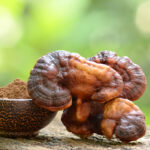Ancient mushroom shows promise as Alzheimer’s breakthrough
 (NaturalHealth365) While pharmaceutical companies continue pouring billions into disappointing Alzheimer’s drugs, researchers are finding exciting potential in an unexpected place – a forest mushroom revered in Eastern medicine for thousands of years. Reishi mushroom (Ganoderma lucidum), called Lingzhi in China, is giving scientists new hope in the battle against dementia.
(NaturalHealth365) While pharmaceutical companies continue pouring billions into disappointing Alzheimer’s drugs, researchers are finding exciting potential in an unexpected place – a forest mushroom revered in Eastern medicine for thousands of years. Reishi mushroom (Ganoderma lucidum), called Lingzhi in China, is giving scientists new hope in the battle against dementia.
What makes this discovery so exciting isn’t just that it works – it’s HOW it works.
The mushroom that does what drugs can’t
Most drugs target just one aspect of Alzheimer’s disease, but this approach has largely failed because Alzheimer’s is incredibly complex. That’s why reishi mushroom is so fascinating – the research shows it addresses multiple pathways simultaneously.
Many people remain skeptical about natural remedies for serious conditions like Alzheimer’s. But the research published in Biomedicine & Pharmacotherapy and other journals reveals something different – actual scientific evidence supporting reishi’s effects on brain health.
Lab studies show reishi’s compounds can significantly reduce inflammatory markers in brain tissue while inhibiting the formation of those toxic plaques and tangles that destroy memory. That’s impressive for any substance, let alone one with virtually no side effects.
What makes reishi different from other “brain boosters”
Most brain supplements make big promises backed by flimsy science. Reishi is different.
When researchers isolated compounds called ganoderic acids from the mushroom, they discovered something remarkable. These natural compounds directly prevent tau proteins from becoming “tangled” – one of the main features of Alzheimer’s disease. They do this by inhibiting specific enzymes like GSK-3β that would otherwise trigger the whole cascade of brain damage.
The research showed that ganoderic acids A and B can inhibit tau phosphorylation at key sites that are crucial in Alzheimer’s development. Meanwhile, other components in reishi fight brain inflammation, reduce oxidative stress, and even inhibit acetylcholinesterase – the same target as several FDA-approved Alzheimer’s medications.
Multiple benefits from one natural source
What makes reishi truly special is how comprehensive its effects seem to be. The bioactive components in Ganoderma lucidum – primarily polysaccharides and triterpenes – work on multiple fronts:
- They inhibit tau hyperphosphorylation (preventing “tangles”)
- They prevent amyloid-beta formation (reducing “plaques”)
- They regulate overactive microglia (brain immune cells)
- They suppress oxidative stress and inflammation
- They boost immunity and provide neuroprotection
Early clinical trials are still limited, but promising. In one pilot study, patients taking reishi spore powder combined with conventional medication showed improvements in cognitive scores and quality of life measurements compared to those taking medication alone.
The history behind the mushroom
What’s fascinating about reishi isn’t just its scientific validation, but its rich history. Ancient Chinese medical texts referred to it as the “mushroom of immortality,” and emperors sought it for its life-extending properties. For thousands of years, it was reserved primarily for nobility due to its rarity in the wild.
Modern cultivation techniques have made reishi more accessible, but its mystique remains. Unlike many trendy supplements that appear and disappear from health food stores, reishi has stood the test of time. It’s been continuously used for brain health and longevity across generations in traditional medicine systems throughout Asia.
Who might benefit most?
The research suggests specific groups may see especially promising results from reishi. People with early-stage cognitive decline appear to respond particularly well, as do those with a family history of Alzheimer’s and individuals with systemic inflammation.
Most interesting, the protective effects seem strongest when used preventatively or in early stages, suggesting this ancient remedy might be most valuable before significant damage occurs. This aligns with the growing consensus that brain protection needs to start decades before symptoms appear.
Beyond reishi: A comprehensive approach to brain health
While reishi mushroom shows incredible promise, protecting the brain requires a more comprehensive approach. The truth is, cognitive decline has multiple causes – from inflammation and toxins to nutrient deficiencies and emotional stress.
That’s why the most effective brain protection strategies address all these factors. Anyone serious about preserving memory and cognitive function needs access to the full spectrum of proven approaches.
Reishi mushroom is just one piece of a much larger brain health puzzle, but the Alzheimer’s and Dementia Summit – created by Jonathan Landsman – brings together 31 of the world’s top experts to reveal groundbreaking strategies for protecting and healing the brain. These 31 expert talks are available now for purchase and include video/audio recordings, easy-to-read transcripts, plus many valuable bonuses.
Sources for this article include:



